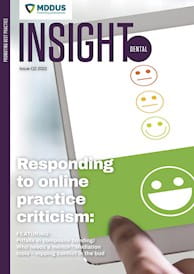 SOCIAL media offers many potential benefits for dental practices, including business promotion, health education and keeping patients informed. However, it is not without some perceived downsides, including potential negative feedback or comments.
SOCIAL media offers many potential benefits for dental practices, including business promotion, health education and keeping patients informed. However, it is not without some perceived downsides, including potential negative feedback or comments.
People may express dissatisfaction about service provision, posting either directly onto the practice social media page or on personal pages. They may also post negative reviews on web-based directories, such as Google reviews, or even official NHS patient resources.
Unfavourable online reviews have become particularly prevalent over the pandemic. Even with restrictions now easing, many dentists and the practices they work for are subject to ongoing negative comments and even online abuse.
A common public misconception is that practices have been “shying away” from their duties, and often this is down to a lack of awareness about the guidelines and working conditions that practices have been operating under during the pandemic. Other common online complaints include delays or lack of access to NHS dental care, treatment complications, dissatisfaction with treatment outcomes or complaints about the costs of private dental care. Regardless of the reason behind such comments, the dentists or dental staff identified in such posts can be left feeling helpless and unsure of their right to respond.
Take time and reflect
A practice may not even be aware of an adverse post until it is brought to attention by another patient or staff member, or the individual who made the comment, now wondering why there has been no response. It is natural to feel upset or defensive about negative online feedback, and the knee-jerk reaction may be to reply immediately to the post to set the record straight.
However, it is best to take time and reflect. Replying rashly to such posts can risk breaching patient confidentiality, and appearing unprofessional or indeed confrontational and in breach of regulatory guidance.
Embracing feedback
It may also be tempting to simply switch off the ability for patients or followers to make comments or leave reviews on the practice social media page, but this may give the appearance that you don’t welcome feedback or suggestions. Remember that patient feedback, even if negative, can be viewed as an opportunity to learn and make positive changes were indicated.
When organisations proactively encourage feedback they often find that positive comments outweigh negative ones. In 2013, the NHS launched the Friends and Family Test (FFT) to help service providers and commissioners in England understand whether patients are happy with the service provided, or where improvements are needed. Patients completing treatment are asked to submit feedback and organisations are encouraged to submit this feedback on a monthly basis. Millions of patients have submitted feedback to FFT and around nine out of 10 comments are positive.
Collecting feedback in this way may deter patients going online to post feedback publicly, leaving you wondering what to do next and whether or not to post a response.
Practical advice
MDDUS often receives calls from dental members seeking advice on how to deal with adverse comments online. This will depend entirely on the particular circumstances.
No response
Posting a reply can risk breaching patient confidentiality, making matters worse, or risk sparking a wider debate, so it may be wise to simply note the comments and leave well alone. A critical comment of you or the practice might also be considered fair and legitimate and that should trigger reflection and possibly a debrief involving the wider dental team. It takes resolve to handle criticism in this way but it should be recognised that in some situations, responding defensively will only make matters worse and cause more issues longer term.
Replying to the original post or comment
This may be the preferred option for practices responding to comments on their own social media profile. Our advice here would be to keep the response succinct and to not go into any specific detail about the patient making the comment – and that includes even confirming that they attend the practice.
Engage with the patient using a confidential channel, such as a direct conversation, or provide details or a link to your practice complaints policy. We advise against contacting the patient via private messaging on their social media page, as this will avoid putting your own privacy and boundaries at risk and also prevent any conversation being taken out of context, for example by someone sharing a screenshot that makes it appear as though you are not being transparent.
An example of this type of response might be: “We strive for high-quality care at our practice and encourage anyone who is dissatisfied with the level of service to contact us direct in order to resolve the matter.”
Provide the practice contact details and suitable times for them to make contact. Responding in this way helps the patient feel their feedback is valued and that you are prepared to take it seriously. It may also prevent more abusive comments being posted, by demonstrating that you view and respond to patient feedback professionally.
Dealing with online abuse or threats
Comments or feedback that are abusive or threatening should be addressed as soon as possible. Either remove the post with an explanation of why (if you have the ability to do so) or contact the relevant platform and request that the post be removed. Also consider contacting the police to report serious abuse or threats.
Some posts may be anonymous, but if you can identify the patient it may be appropriate to contact them directly in writing using their registered contact details to explain why their post is unacceptable and to issue a formal warning.
Regulatory guidance
The GDC has specific guidance regarding social media and reminds dentists that:
When using social media, you must:
a) Maintain and protect patients’ information by not publishing any information which could identify them on social media without their explicit consent;
b) Maintain appropriate boundaries in the relationships you have with patients and other members of the dental team;
c) Comply with any internet and social media policy set out by your employer.
Professional or casual online forums
Another area of social media requiring some caution is online engagement with other healthcare professionals. This may involve sharing ideas and views for educational purposes or for mutual support. Sometimes individuals may share personal views on colleagues or other practices that are not always professional.
Unfair criticism on such sites can leave some professionals feeling bullied or targeted by their peers.
MDDUS discourages engagement in such discussions and reminds members to take account of the GDC standard 9.1.3, which states that dentists: "must not make personal, inaccurate or derogatory comments about patients or colleagues". This includes comments made on social media.
Should you feel it necessary to raise concerns about the conduct of another dental professional, there are specific steps to take as set out in GDC Standards principle 8.
Practice policy
Practice owners or managers are advised to establish and regularly review a policy on social media use that includes guidance on how to deal with online feedback. This will help staff understand their responsibilities in regard to their own personal online presence.
Such a policy should specify that any online practice feedback should be raised first with management and not responded to on an individual basis.
In this online, connected world we now live in, it is inevitable that patients will air their views and experiences of personal healthcare. Online criticism may be unfair or not – but is important to be aware of the options on how to respond.
Follow the regulatory guidance to ensure expected standards are maintained, and if in doubt, do not hesitate to contact MDDUS for advice.
Kay Louise Grant is a risk adviser at MDDUS
This page was correct at the time of publication. Any guidance is intended as general guidance for members only. If you are a member and need specific advice relating to your own circumstances, please contact one of our advisers.
Read more from this issue of Insight Dental

Save this article
Save this article to a list of favourite articles which members can access in their account.
Save to library